Robert 'Bob' Prohaska
From Pollywog to a real "Pro"With a twinkle in his eye, Bob Prohaska will tell you that his mother received the best gift ever when he was born on Mother's Day, May 14, 1927. The youngest of three boys he spent the first few years of his life on Dolloff Road, just across the street from St. Alexis Hospital. When Bob was only 7 his father died at home in bed from pneumonia and pleurisy. Bob went to live with an aunt just off Warner Road for a couple of years. Then his mother remarried and the three boys had the choice of taking their new stepfather's name or keeping their old name. Bob was the youngest, and only 10 years old, and decided to go with the new name. His brothers kept the original family name, McGonagle. At this time he was living on Broadway with the LTV Steel Office Buildings in his back yard. 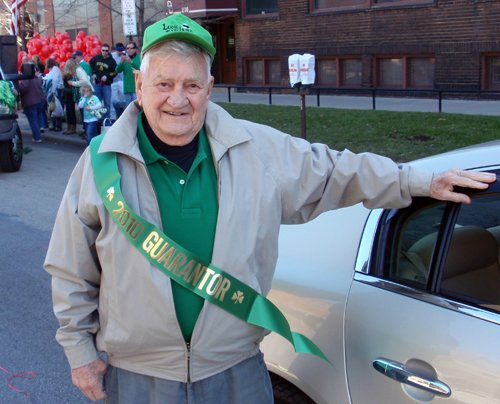
Bob Prohaska honored at St. Patrick's Day in 2010
Bob moved a few times until finally, at the age of 14 he wound up in East Cleveland on Oronoco. He went to Holy Name through the 8th grade. He then registered for Myron T. Herrick Jr. High. It was soon discovered that he was living in East Cleveland and going to school in Cleveland and the principal was going to ask him to leave. He was fortunate enough to have his Home Room teacher intervene for him and promise that Bob would be in school every day. To keep good his promise, this teacher picked him up every morning at Euclid and Superior and drove him back every evening.Times were hard then and Bob decided to quit school at age 16. He went to work at Wellman Engineering at 71st and Central where he became a rivet heater. He was soon transferred to the office as a timekeeper. Bob played Softball for Wellman, in an industrial league. Softball was a passion for him then, and always. One day they played against Jack and Heinz. The manager of Jack and Heinz liked the way he played third base and asked him what he did at Wellman and what he earned. Bob told him he was a timekeeper making 75cents an hour. The manager offered him $1.00 per hour to come work for them and play on their team. Bob told his supervisor he was quitting. The supervisor sent him to the "big boss" who told him "There's a war on. Your job is frozen. You can quit but you can't go work for someone else." So Bob, or "Pro" as so many of his friends call him, angry at not being able to work where he wanted, quit Wellman Engineering and joined the Navy - something nobody could stop him from doing! 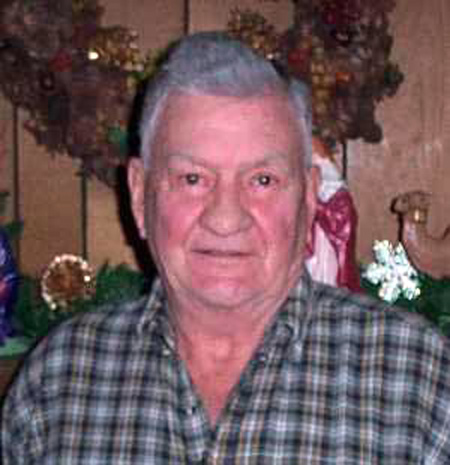
Bob Prohaska
On August 21, 1944 he went to boot camp in Great Lakes Illinois. Then, in late 1944 he was sent to the west coast and assigned to the USS Killen. He was a seaman whose GQ duty (General Quarters - emergency duty) was as hot shell man on a 5 inch gun.One very significant event in the life of seaman Prohaska came on May 8, 1945, when he crossed the equator for the first time. Those who have crossed the equator before were referred to as "shellbacks"; the first time crossers were referred to as "pollywogs". The day before they were to cross, the pollywogs, Bob included, staged a traditional mutiny on the shellbacks, taking prisoners, cutting their hair etc. Then the day of the crossing came. Uniform of the day was white shorts, white tee shirt and sneakers. A "Royal Messenger" came and told Bob to stand at the front end of the ship and watch for the equator. The attached cardboard wings to him and strapped him in, as he stood there and watched. After some time a man dressed in cap and gown, like a college graduate approached and told him to report to his Captain that King Neptune is aboard and that the initiation would commence at 1300 hours. Bob had never been to the Captain's Office before and was not sure how the Captain would take this, but he went. The Captain, it appeared, was expecting him and told him to proceed. There were about thirty-five pollywogs on this ship that held three hundred people. The shellbacks formed two lines. First the pollywogs were hosed down with salt water. Then, as the pollywogs crouched through the lines they were beat with flattened hoses. At the end of the line, Bob was met by the "Royal Judge" and "Royal Secretary". He was handed a subpoena (a treasured memento Bob has to this day) detailing his crimes, which included Mutiny; Cutting the Hair of a Shellback and Seeking Sympathy. Bob was told to kneel to plead his case. Now, standing behind him was "The Royal Devil", yet another member of King Neptune's court! The Royal Devil not only had a red outfit and horns, but he had a low-voltage electrified pitchfork as well. As he tried to open his mouth to plead his case, the Supply Officer was dropping raw rice into his mouth and the Royal Devil was jolting him with electricity! After this task, Bob came across the "Royal Baby". This was the fattest man on the ship who, sitting in a big chair, had his stomach all greased. Bob (and the rest of the pollywogs) all had to kiss the stomach of the Royal Baby and then had their face pushed into the grease! Still not done, the next trip was to the "Royal Doctor". Here there was a gurney set up. Bob was laid out on the gurney and told his gallbladder had to come out. The Royal Doctor also used low voltage electricity, this time in an electrified knife. The knife was run down his stomach and then he was told his gallbladder looked ok, so they were going to put it back. To accomplish this, they took large hunks of raw liver and tried to force it down his throat. Next stop - the "Royal Barber" where the cut a large "V" for victory into each pollywogs hair, and then to the "Royal Bath". The Royal Bath was a huge tarp of garbage and diesel oil and assorted waste materials. It was approximately waste deep and the shellbacks dunked his head into it three or four times. Two more trips through the paddling line and Bob was officially a shellback. Next time he would be on the other side of the paddling line! He crossed the 180th meridian (International Date Line) on May 3, 1945. He has ribbons for the Asiatic Pacific Theater, The American Theater and a battle star for his attacks on Borneo. As a Seaman First Class he was assigned Deck Duty as his general (non-emergency) duty, which included swabbing the deck, cleaning, etc. Bob had a run-in with one of his foremen one day and as a punishment was sent to Mess Cook (the Navy Equivalent of KP duty). It was Bob's job to clean up, serve the food, wash trays, etc. This was a three-month duty assignment. When the three months were up, knowing that the foreman on deck was still angry and would be looking for revenge, Bob asked for three more months and his request was honored. During this time a space opened up in the Galley as an Apprentice Cook. Bob applied for, and received this job. He stayed in this position until the end of the war. It was April 12th when Bob left the States to go to Pearl Harbor. He remembers the date well because the flags were flying at half-mast because, he was later to find out, President Roosevelt died that day. From Pearl Harbor he went to Admiralty Islands, the Philippines and took part in two invasions in Borneo. His ship escorted General MacArthur to every port in the Philippine Islands. MacArthur got off in every port and spoke to the troops. Bob and his other shipmates where not permitted ashore, but from time to time they were allowed to swim off the side of the ship. Bob was suffering from a terrible heat rash that was aggravated by the salt water. He told the ship's doctor he needed to get transferred out of the hot climate. The Doctor told him he would cure him of his heat rash in 2 weeks. Bob took that to mean they were headed north in two weeks, and in fact, they did head off to the Aleutian Islands. Bob went back to the States around Christmastime, 1945 and was discharged from Great Lakes, Illinois in June 1946. Bob remembers every moment of his Navy days as if they were yesterday and with great fondness. One can tell by listening to him tell the stories he would do every bit of it again if he were given the chance. When he came home the Navy gave him $20 per week for 52 weeks. Not enough to live on, Bob went to work on the railroad. He became a "switch tender" at the east end of the Collinwood yard at the top of the Dille Road Bridge. He would line up the cars and be sure the trains were in order. He was soon promoted to Brakeman. Although he was only working as an "extra" (when one of the regulars wanted or needed to be off) he was working eight hours on and eight hours off. At $10.02 per day, flat rate, he was making over $200.00 per week! His lack of sleep caused a few minor accidents, but Bob laughs, "Those things happen!" As a brakeman it was his job to hang onto the outside of the cars and connect and disconnect the trains. It was a miserable day, one day. The rain was coming down and Bob was working on the outside of the train. He complained about the weather and working conditions. He was told that when you work on the railroad you work rain or shine, so he decided not to work on the railroad. He quit that job and went to work at White Motors. His plan was to be trained as a machinist, but that plan didn't work out too well. So instead he went to work in the plant in a multitude of departments. The best part of the job was that they had a softball team, but it still wasn't enough to hold his interest, so he quit that job too. Next Bob went to work at Allman Moving & Storage on West 84th and Lake. At first he was excited to know they had a ball team, but they changed it to Slow-pitch and eventually dropped it all together. His Supervisor knew about Bob's interest in sports and gave him all the sports related jobs. In 1948 Cleveland hosted a bowl game with Villanova and Kentucky. Bob was in charge of moving all of the equipment and supplies. At this time the Browns practiced at League Park and played their games at Cleveland Stadium. Every Saturday, it was Bob's job to take everything from League Park to the Stadium and hang up clothes and equipment by the lockers. At this time the Browns were in the American League, before the NFL.
One weekend Bob was scheduled to work but had an opportunity to go out of town. He asked for the time off and when he couldn't get it he quit. Around this time, Bob was still living on Oronoco in East Cleveland and was driving a 1924 two door Model A Sedan. He had drapes on the windows and linoleum on the floor. The car was painted all green with decals. Down the street was a young girl by the name of Alice whose brother hung around with Bob's brother. Alice just thought Bob and his car were the greatest! One day Bob got a phone call from a young lady (a friend of Alice's) who said if he wanted to meet her he should go to the Drug Store on the corner of Stranton and Euclid Ave. Of course Bob wanted to know who this mystery woman was, so he went. When he got there, Alice and her friend were sitting at the soda bar, but Bob never thought it could be them and kept on walking. Alice and her friend left. Bob, not getting to meet the mystery woman, went home. A few minutes later the phone rang again. This time it was Alice in person and she told him how her friend had called and how they left the Drug Store. Alice's mother made her call and apologize for running out like that. Bob wasn't going to miss another opportunity, so he told her that her punishment would be a date with him. They went to the Commodore Theatre on 152nd Street and Lakeshore where they saw Golden Earrings with Marlene Dietrich. Later that same year, Thanksgiving Day, 1948 they got engaged and on July 16, 1949 at St. Philomena's Church in East Cleveland, they were married. When Bob quit Allman Moving & Storage the man who would eventually marry Alice's mother offered him a job as a pipe-coverer. This was something Bob knew nothing about was willing to learn. 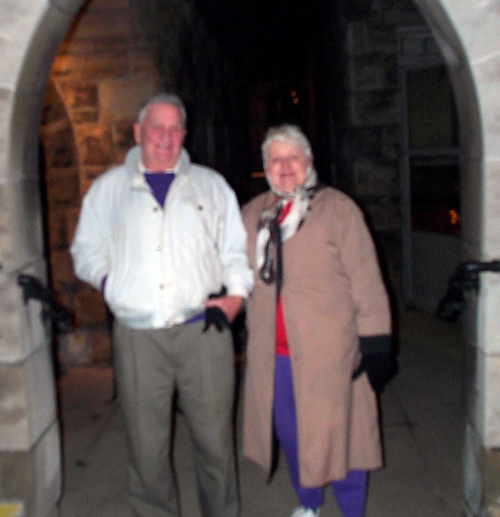
Bob and Alice Prohaska at St. Philomena Church
He finally found his calling. He worked the next 22 years at Clark Asbestos and 27 years at ISS Insulation. He has been a proud member of Asbestos Workers Local 3 since 1948 where he is still an honorary member to this day. He is also on their Building Committee.He and Alice have five children (Bobby, Mary Alice, Gerri Ann, Tommy and Jimmy) and four grandchildren (Kenny, Timmy, Karen and Mathew). He has always been passionate about softball and in addition to playing for Wellman Engineering and White Motors he also played for Dylan Knights of Columbus (84th & Superior); St. Philomena's Holy Name and Windermere Knights of Columbus. He is proud to report that the Windermere K of C placed second in the State of Ohio. Of course he also played when he could when he was in the Navy, but that hardly counts to him because it was always on a beach! 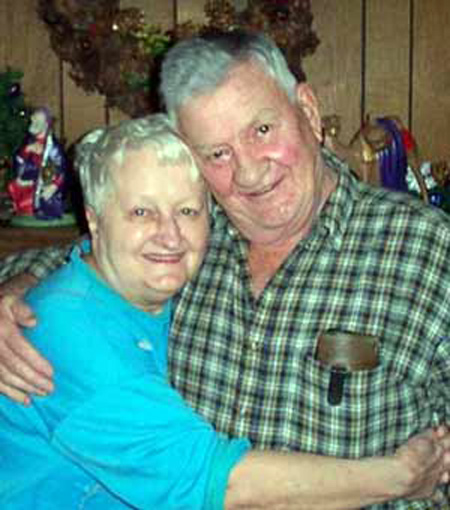
Alice and Bob Prohaska
Bob and Alice moved to Cleveland Heights in 1961 and are happily living there today.It doesn't take much to make Bob happy. He is delighted at the possibility of helping people. He prays to St. Jude every night to help him find someone he can do something for. He does not brag about his good works, in fact he does not talk about them easily. But they cannot be ignored. Neighbors who he has helped in so many ways from shoveling snow to fixing plumbing have nominated him to television for the Hometown Hero recognition he so richly deserves. He is never further than a phone call away from a friend or neighbor who needs assistance. 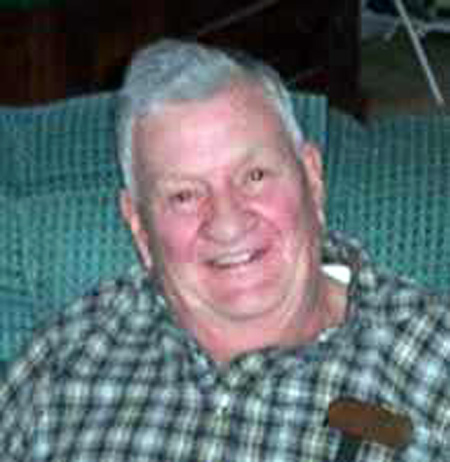
Bob is an usher at his church, St. Philomena. He plays cards with friends he has had for fifty years. He looks after the families of his deceased friends. And Bob is probably one of the all-time best joke tellers. Not all of his jokes are new. They're not always even funny (though most are). But to hear him tell a joke and watch the sparkle in his eye, you can't help but feel good and smile and laugh right along with him. He is the bearer of good will and loves to make people laugh. As soon as you hear the words "Did I tell you the one about…" you know you're going to feel better in a moment than you did before he started. There are some things that make Bob very angry. He is especially unhappy with financial injustice and worries about the workingman being neglected. Given the opportunity to speak to today's youth, Bob would like to tell them simply to take heed of the morals and discipline taught by their parents. And above all else, be considerate of others. Smile. Hold a door open. Say Hello. Help out a friend whenever you can. And to parents, Bob's message is even simpler. "Raise your children. Don't just push them out on the street and wish them well. Raise them." Maybe the message that Bob Prohaska gives all of us is one of simple kindness. How much better off we would all be if we could follow the example he sets and treat people with the genuine compassion and friendship that Bob shows. He is a good man. It is that simple and that complex. For as the saying good "A good man is hard to find". His friends are all grateful that they have found him. Profiled by Debbie Hanson (2004)
Top of Page
Back to Profiles of Cleveland Seniors
|